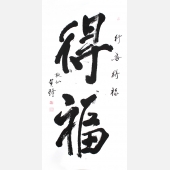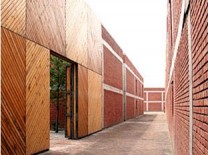- 资质:AGA 艺
- 评分:
1分 2分 3分 4分 5分 6分 7分 8分 9分 10分 7.4分
- 印象:
- 经营时间:18年
- 展厅面积:
- 地 区:北京-朝阳-草场地
ArtSlant: A Conversation with Guo Hongwei
2010-12-19 11:30:36
New York, April 2010: Earlier this month New York audiences were introduced for the first time to the coy and masterful minimalism of young Beijing-based painter Guo Hongwei. Taking everyday objects as his point of departure, Guo provocatively demonstrates his comfort with experimental techniques and radical interiority-- not to mention a keen sense of humor.
ArtSlant Editor, Sophia Powers, had the pleasure of speaking with Guo Hongwei in the courtyard of the Chambers Fine Art
where his solo show is up until May 15th. The day was brisk, the sun sharp, and the conversation lively.
Sophia Powers: A question I often like to begin with is when you knew you wanted to be an artist. I know your father was a respected calligrapher. Did he teach you to paint when you were growing up?
Guo Hongwei: No, he didn’t teach me directly. But my childhood was very much shaped by growing up in a home withpainting, calligraphy, seals, and art books everywhere. As for choosing a career as an artist, it’s actually a funny story… In high
school, my mother asked me what major I wanted to take up. I had to decide. But I said all I wanted to to was play and have fun all the time. So my mother said: “why don’t you become an artist?” And I thought “ok.” That’s how it happened! But, I think like every kid I just tried lots of things and then found what I liked. Painting was something I was good at, and I felt that in a family that was so aesthetically-inclined, I was recognized for it.
SP: You’re very lucky to have such open and encouraging parents!
GHW: That’s true. They really just let me do what I wanted to do.
SP: I’ve heard you are also a big music lover—and even have your own band. Did you ever consider taking up music as a profession?
GHW: I never thought about being a musician seriously. For me, music is more of a way to develop a connection to the outside world—an avenue to form opinions and a real perspective. But, my friends and I did organize a really funny band! We’re all improvisation—we don’t write our music, and we don’t even practice. We just chose what we like and then develop our own renditions. We think we’re the best artists in the music circuit!
SP: Do you work with music in your studio? Or do you keep art and music separate?
GHW: There aren’t really any fixed rules to the way I work. Usually I search through my c.d. collection and just put on whatever I’m in the mood for. Some mornings I get right to painting and forget to put on anything at all. So, there’s no routine. In fact, if I’m not in the mood to paint I don’t paint. I’ll pick up a book or watch a movie instead.
SP: Are you ever worried about not getting enough work done? I mean, when you are preparing for a show, for instance, what if you just don’t feel like working? Or, your alarm clock rings and you just want to keep sleeping?
GHW: Then I would turn it off and go back to bed! I think I can handle the balance—I can adjust my mood so that when I’m in the studio, I’m totally into my work. I used to have a problem when I was feeling blue, but now it’s not so hard to manage.
SP: You’re lucky! I wish I was so good at regulating my own work.
Another thing I wanted to ask you was about the art culture in Beijing these days. Some young artists I have spoken with have expressed quite a sense of cynicism about how big money has changed the way people in the artistic community relate to each other. For instance, people aren’t interested in talking about art or ideas so
much as they’re interested in talking about money. Do you find this to be true?
GHW: Hmm- I think perhaps people are just pretending to be cool when they talk about money because they want to hide their true nature. Most of the artists I know really have a soft heart, and they’re full of idealism. They know what they want— what
they care about—but they perhaps want to hide that true self and pretend to be somehow more practical. But then when they’re with their really close friends, they close the door and discuss a new idea, a new plan, or just think out problems out
loud. Actually, I find that when someone gets a really high price at an auction or something they feel quite uncomfortable about it, and don’t want to discuss it at all!
SP: One of the things that drew me to your work was the fact that it looked so different from many of the stereotypes of “Chinese contemporary art.” Were you ever pushed to—or drawn to—making more explicitly political/conceptual installation work, as so many artists in the generation before you laid the groundwork for?
GHW: I’ve always had interest in doing some really conceptual works, but not necessarily to show—just to discuss with my friends. In fact, for awhile I thought about doing a small installation for this show, but after thinking more about it, I realized that I liked the consistency of just having these paintings all together on the walls. I think there are a lot of people in my generation that are also making conceptual works, but in a fresh way. The difference between us and the older generation is that they used cultural symbols and politics as a bridge to the west. The new generation is more introspective—into texture and methodology, as opposed to ideology.
SP: But, of course, your work is political as well. I’m thinking of the piece: “89.6.”
GHW: Oh yes—I wanted to hide a secret in the work! For me humor is a very interesting point to make. I think this approach is also characteristic of many younger artists. We don’t want to address the problem head-on, because it’s so painful, so you use euphuism instead. The barriers are painted on a real life picture of the incident, but you would never know this with the pure white background.I want to separate art and life, for the most part. I want to paint things that bring happiness, not bitterness. I want to be optimistic—to bring delight to people. But, of course, there is a reality out there to be concerned about.There are artists like Ai Wei Wei who are real activists, and use their art as a form of activism. But Ai Wei Wei also does work that is not political. To my mind there are enough problems out there in the world, and if you’re going to hang something in your living room then what do you want to live with? If you’re not careful, then every day is a blue day.
SP: My last question is a bit of an odd one: Is there anything you would like me to ask you?
GHW: (laughs) Hmm—well, if you want me to talk about my works then it’s a long story because I’m really good at it! I suppose what I would like to tell everybody about is what I call a “perceiving ability.” I want people to look carefully at things in their everyday life, and to really have perspective on how beautiful they can be. To see the small things in your own world in fresh ways—this is actually the best way to understand my work. It might be something you pass by everyday, but if you stop
and focus on it you can see something lovely or humorous. Then you too will become an artist because you will have an artist’s eyes.

 黄琦
黄琦 测试用艺术
测试用艺术




